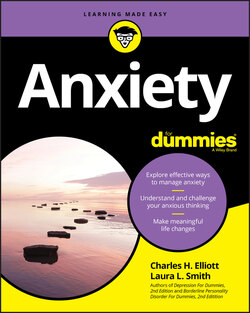Читать книгу Anxiety For Dummies - W. Doyle Gentry, Laura L. Smith - Страница 29
Examining What Anxiety Is All About
ОглавлениеIN THIS CHAPTER
Determining whether you have a problem with anxiety
Looking at symptoms of anxiety
Uncovering anxiety companions
Anxious feelings sprout up for most folks here and there and are completely normal. In certain situations, anxiety is a perfectly understandable reaction. For example, if you’re driving in a snowstorm and your car starts to spin out of control, feeling anxious makes sense. Or, if you are in the middle of a pandemic and the numbers of infections keep rising, well, if you didn’t feel a bit anxious, we’d worry about you. But sometimes anxiety signals something more serious. When anxiety is not tightly connected to realistic concerns and interferes with your ability to function day to day, it’s a good time to worry about your anxiety.
To get a feel for the difference between something as serious as an anxiety disorder and a normal reaction, read the following description and imagine ten minutes in the life of Viktoria.
Viktoria feels restless and shifts her weight from foot to foot. Walking forward a little, she notices a slight tightening in her chest. Her breathing quickens. She feels an odd mixture of excitement and mounting tension. She sits down and does her best to relax, but the anxiety continues to intensify. Her body suddenly jerks forward; she grips the sides of her seat and clenches her teeth to choke back a scream. Her stomach feels like it might come up through her throat. She feels her heart race and her face flush. Tiffany’s emotions run wild. Dizziness, fear, and a rushing sensation overtake her. The feelings all come in waves — one after the other.
You may wonder what’s wrong with poor Viktoria. Maybe she has an anxiety disorder. Or possibly she’s suffering a nervous breakdown. Perhaps she’s going crazy. No, Viktoria actually wanted to feel scared and anxious!
You see, she was at an amusement park. She handed her ticket to the attendant and buckled herself into a roller coaster. After that, you probably understand the rest of her experience. Viktoria doesn’t have a problem with anxiety, she isn’t suffering a nervous breakdown, and she isn’t going crazy. As her story illustrates, the symptoms of anxiety can be ordinary and sometimes even desired reactions to life.
In this chapter, we help you figure out whether you’re suffering from problematic anxiety, everyday anxiety, or something else. We take a close look at all the different forms and symptoms of anxiety. Then, we discuss some of the other emotional disorders that often accompany anxiety.
Mental health professionals refer to emotional problems as disorders. For example, instead of saying you’re depressed, they say you have a depressive disorder or some other type of mood disorder. A reasonable case can be made for using the term “disorder.” Although we use the word from time to time, we prefer to think of so-called disorders as normal reactions to a combination of biological, genetic, environmental, and interpersonal factors, as well as learned behaviors and problematic thoughts.
